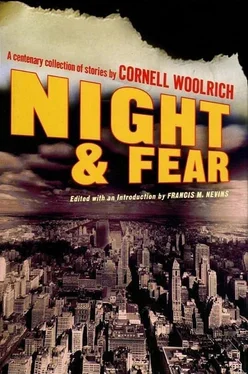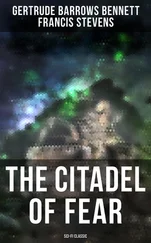Blake, mechanically continuing to shuffle cards without dealing them any more, said: “In that top drawer over there,” without looking around. “And wipe it off after you use it, I’m particular.”
The drawer slid out. There was a moment of silence, then they heard Harkness remark, “Old Faithful.”
Rogers opened his heavy-lidded eyes and Blake turned his head. He’d found Blake’s gun in the drawer, had taken it out and was looking it over. “Ain’t you afraid of him knowing you’ve got this?” he grinned at Blake.
“Aw, he’s known I’ve had it for years. He knows I’m licensed for it, too.” Then he added sharply, “Quit monkeying around with it, put it back where it belongs.”
“O.K., O.K.,” Harkness consented casually.
He laid it down on the bureau-scarf, reached for the comb instead.
Blake turned back again to his repetitious card-shuffling. Rogers, who was facing that way, suddenly split his eyes back to full-size at something he saw. The blurred sleepiness left his voice.
“Hey, that busted button of yours is tangled in the fringe of the scarf, I can see it from here, and the gun’s right on the edge. Move it over, you’re going to—”
The warning had precisely a reverse effect. It brought on what he’d been trying to avoid instead of averting it. Harkness jerked up his forearm, to look and see for himself; anyone’s instinctive reflex in the same situation. The scarf gave a hitch along its entire length, and the gun slid off into space.
Harkness made a quick stabbing dive for it, to try to catch it before it hit the floor. He made it. His mind was quick enough, and so was his muscular coordination. He got it on the drop, in mid-air, in the relatively short distance between bureau-top and floor. But he got it the wrong way, caught at it in the wrong place.
A spark jumped out of his hand and there was a heavy-throated boom.
Then for a minute more nothing happened. None of them moved, not even he. He remained bent over like that, frozen just as he’d grabbed for it. Rogers remained seated at the table, staring across it. Blake continued to clutch the cards he’d been shuffling, while his head slowly came around. Rogers, at least, had been a witness to what had happened.
Donny Blake had even missed seeing that much.
Harkness was moving again. He folded slowly over, until his face was resting on the floor, while he remained arched upward in the middle like a croquet-wicket. Then he flattened out along there too, and made just a straight line, and lay quiet, as though he was tired.
Rogers jumped up and over to him, got down by him, turned him over. “Help me carry him over onto the bed,” he said, “It musta hit him—” Then he stopped again.
Blake was still stupidly clutching the deck of cards.
“He’s gone,” Rogers said, in an oddly-blank voice. “It musta got him instantly.” He straightened up, still puzzled by the suddenness with which the thing had occurred. “I never saw such a freaky—” Then he saw the gun. He stooped for it. “What did you leave it lying around like that for?” he demanded irritably. “Here, take it!” He thrust it at its owner, and the latter’s hand closed around it almost unconsciously.
Blake was finally starting to get it. “A fine mess!” he lamented. He went over to the door, listened. Then he even opened it cautiously, looked out into the hall. The shot apparently hadn’t been heard through the thick walls and doors of the venerable place they were in. He closed it, came back again. He was starting to perspire profusely. Then, as another thought struck him belatedly, he took out a handkerchief and began to mop at himself with something akin to relief. “Hey, it’s a good thing you were right in here with the two of us, saw it for yourself. Otherwise you might have thought—”
Rogers kept staring down at the still figure, he couldn’t seem to come out of his preoccupation.
Blake came over and touched him in anxious supplication on the arm, to attract his attention. “Hey, Rodge, maybe you better be the one to report it. It’ll look better coming from you, you used to be on the force yourself—”
“All right, I’ll handle it,” Rogers said with sudden new-found incisiveness. “Let’s have the gun.” He lined his hand with a folded handkerchief before closing it on it.
Blake relinquished it only too willingly, went ahead mopping his face, like someone who has just had the narrowest of narrow escapes.
Rogers had asked for his old precinct number. “Give me Lieutenant Colton.” There was a moment’s wait. He balanced the instrument on one shoulder, delved into his pockets, rid himself of all the paper currency he had on him. He discarded this by flinging it at the table, for some reason best known to himself.
In the moment’s wait, Blake said again, mostly for his own benefit: “Boy, it’s the luckiest thing I ever did to ask you in here with us to—”
Rogers straightened slightly. Three years rolled off him. “Eric Rogers reporting back, lieutenant, after an extended leave of absence without pay. I’m in room Seven-ten at the Hotel Lancaster, here in the city. I’ve just been a witness to a murder. Donny Blake has shot to death, with his own gun, a man named William Harkness. Under my own eyes, that’s right. Orders, lieutenant? Very well, I’ll hold him until you get here, sir.”
He hung up.
Blake’s face was a white bubble. It swelled and swelled with dismay, until it had exploded into all the abysmal fright there is in the world. “I wasn’t near him! I wasn’t touching it! I wasn’t even looking! I was turned the other way, with my back to— You know that! Rogers, you know it!”
Rogers kept holding his own gun on him, with the handkerchief around it. “Sure, I know it,” he agreed readily. “I know it and you know it, we both know it. You hear me say it to you now, freely, for the last time, while we’re still alone here together. And after this once, neither God nor man will ever hear me say it again. I’ve waited three years, seven months, and eighteen days for this, and now it’s here. You found a loophole once. Now I’ve found a loophole this time. Your loophole was to get out. My loophole is to get you back in again.
“Listen to me so you’ll understand what I’m doing, Blake. You’re going to be arrested in a few more minutes for murder. You’re going to be tried for murder. You’re going to be — if there’s any virtue left in the laws of this State — executed for murder. They’re going to call that murder by the name of this man, Harkness. That’s the only name that’ll be mentioned throughout the proceedings. But the murder you’re really about to be arrested, tried, and electrocuted for will be that of a man whose name won’t appear in it once, from first to last, from beginning to end — Police Sergeant O’Neill. That’s the murder you’re going to die for now!”
Afterword to “Three Kills for One”
“Three Kills for One” ( Black Mask, July 1942) is the most shattering of all Woolrich’s Noir Cop stories. Its opening scenes, portraying the last quiet moments in the life of a man marked for destruction, are strikingly similar in mood to the first half-hour of Alfred Hitchcock’s haunting The Wrong Man (1956). When Rogers resigns from the force and devotes three years of his life to shadowing and hounding Blake, carrying on the quest without money or visible means of support as if his rage for “justice” were all the food and drink he needed, we are reminded both of the psychotic Julie in The Bride Wore Black and of Javert’s sadistic stalking of the hapless Jean Valjean in Victor Hugo’s Les Miserables. Anyone who thinks we’re meant to agree with Rogers, or to see him as a hero, has wandered off into a Dirty Harry world radically at odds with the world of Woolrich where, with very few exceptions, these monsters with licenses to torture and kill are the vicars of the unseen malevolent powers that rule our lives.
Читать дальше












